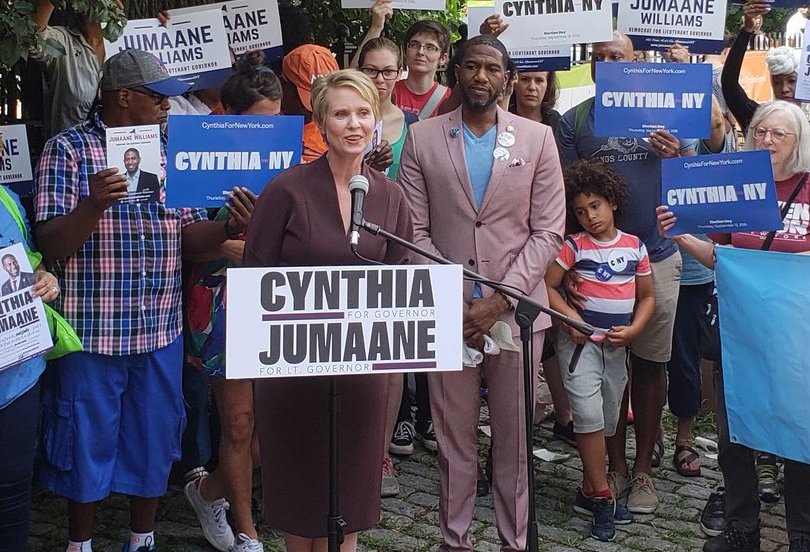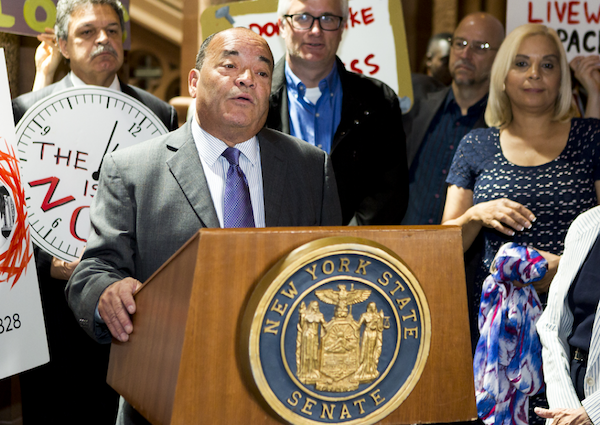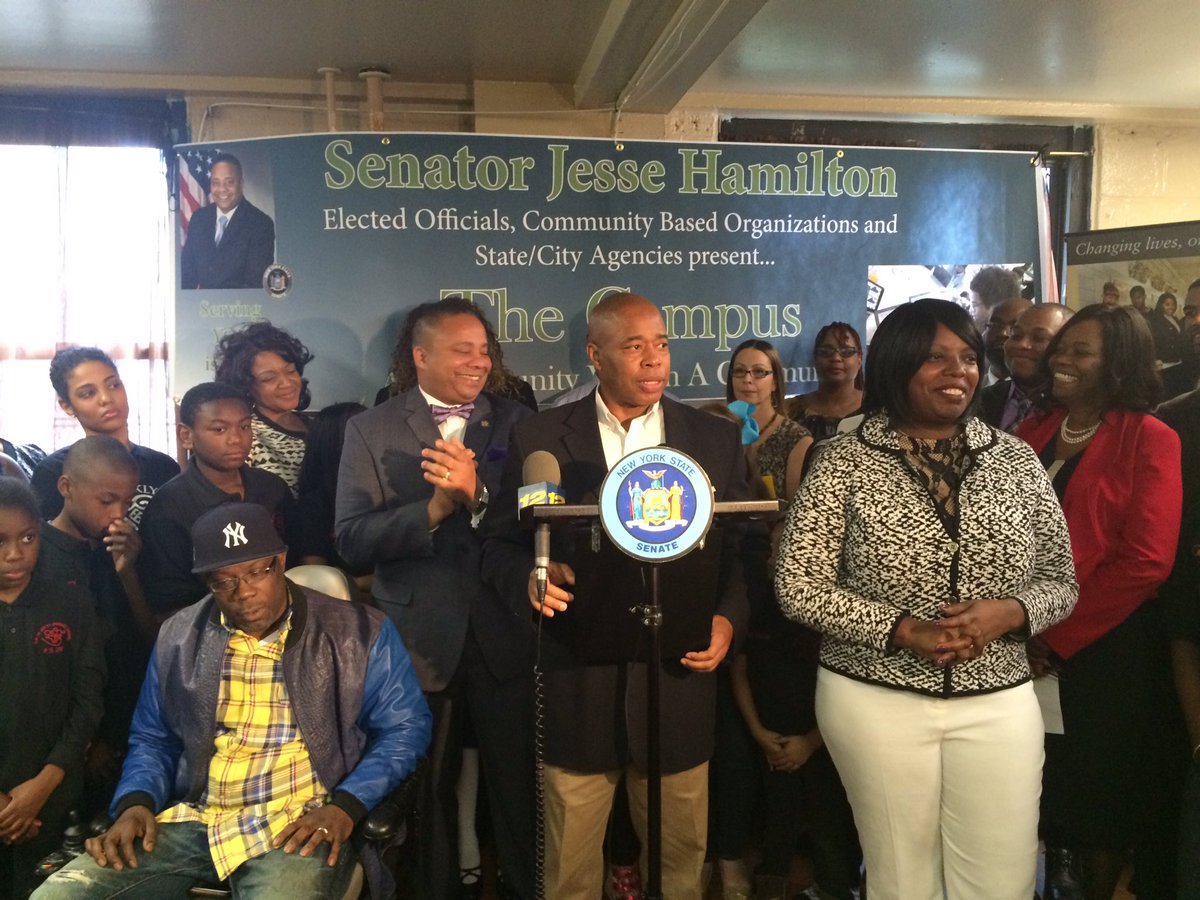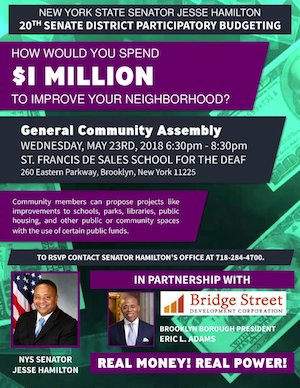Democratic Candidates for Governor and Lieutenant Governor File Pre-Primary Fundraising Numbers

Cynthia Nixon and Council Member Jumaane Williams (photo:@CynthiaNixon)
Governor Andrew Cuomo, a two-term Democrat, spent millions over the last month on his reelection campaign, far outpacing his Democratic primary rival, actor and education activist Cynthia Nixon, according to pre-primary campaign finance disclosures filed by candidates this week with the state Board of Elections. Cuomo’s running mate, Lieutenant Governor Kathy Hochul, overwhelmingly outraised her own primary opponent, New York City Council Member Jumaane Williams.
Cuomo spent a whopping $7.5 million and raised about $845,000 in just one month, between July 17 and August 13, and still has $24 million left in cash on hand. Most of the money was spent on television advertisements, with over $4 million paid to New Jersey-based Media Fortitude Partners, a media buying firm. Another $1.3 million for advertisements went to Motus Strategies LLC. The campaign also paid $384,000 to Bully Pulpit Interactive, a communications consulting firm based in Washington, D.C. Over the course of the election cycle, the governor has raised $35.5 million and spent $19.6 million in total.
The governor’s campaign also made large charitable contributions in this most recent filing period totalling $422,000 to various organizations across the state including the Legal Aid Society, Planned Parenthood, the Puerto Rican Family Institute, the National Institute for Reproductive Health Action and NOW NYC. The donations seem to be drawn from a pot of money set aside by Cuomo in January last year owing to the arrest on corruption charges of several upstate executives who had donated large sums to his campaign along with Joe Percoco, a former top aide and Cuomo campaign manager. Percoco and the executives were recently convicted in federal court.
As he seeks a third term in office, Cuomo has also been bent on making an impact at the national level. He has been putting the state Democratic party’s resources into electing more Democrats to the House of Representatives, to reclaim control of the chamber from Republicans. On Tuesday, his campaign announced the creation of a federal political action committee called “Cuomo NY Take Back the House PAC” which, according to the campaign, has contributed the maximum $2,700 each to ten Democratic congressional candidates across New York State. The PAC has yet to file financial disclosures with the Federal Election Commission.
“With Trump and Republicans in Washington threatening New York’s way of life – from healthcare and women’s rights to immigration and tax reform – the Governor is laser focused on taking back the U.S. House to protect the people of this state,” said Maggie Moran, Cuomo’s campaign manager, in a statement.
Nixon, on the other hand, raised only about $392,000 for her insurgent gubernatorial bid, and spent $606,000 in the same one-month period. Though Nixon has only about $442,000 left to spend, her campaign has touted the nearly 43,000 thousand individual donations it has received in the last five months as evidence of the strength of her campaign and has repeatedly emphasized that Nixon has refused all corporate donations. Nixon’s campaign pointed out Tuesday that those individual donations outnumber Cuomo’s own individual donors from his four runs for governor and that 98 percent of Nixon’s contributions came from small dollar donors, who only accounted for about 0.2 percent of Cuomo’s fundraising. In-kind contributions made up a large part of Nixon’s fundraising, with just under $88,000 coming from the Working Families Party and $11,250 that Nixon gave herself. Since jumping into the race, Nixon has raised a total of $2 million and spent $1.3 million.
“We are seeing a level of grassroots momentum that Cuomo has failed to tap into during his entire two decade career in New York politics,” said Hayley Prim, Nixon’s campaign manager, in a statement. “There is a real hunger in New York to elect a real progressive who is beholden to the people, not corporations and millionaires.”
On Monday, Cuomo finally agreed to a primary debate, which Nixon had pushed for months. The two will participate in an hour-long debate hosted by WCBS at Hofstra University on August 29, just two weeks before primary day.
In the lieutenant governor race, Hochul, the Democratic incumbent, raised nearly $460,000 and only had about $143,000 in expenditures, leaving her a balance of about $1.6 million. Candidates for governor and lieutenant governor run separately in the primary election, which is September 13, and on a joint ticket for the general. Hochul has raised a total of $1.7 million for her reelection so far and spent about $375,000.
Williams, Hochul’s primary opponent, only raised about $25,000 and spent about $32,000. He has just under $39,000 in cash on hand. Notably, Williams refunded $10,000 to Glenwood Masonry Products after it emerged in his previous filing that he had accepted multiple over-the-limit contributions. He has not yet returned another $25,000 in improper contributions in total from two other firms linked to the same developer as Glenwood Masonry, despite promising to do so. Once he does, his campaign balance will fall to just under $14,000. Williams' total fundraising for the race, including those contributions, is about $207,000, of which he has spent $151,000 so far. A Williams campaign spokesperson did not respond to a request for comment.
The Hochul campaign, which has also repeatedly chastised Williams for not releasing his tax returns from the last five years, pounced on the Council member’s failure to return the money. “The question is simple...where’s the money?” read a statement from the campaign, “Councilman Williams stated in late July that he would ‘definitely’ return the donations, and after almost a month he still hasn’t kept his word. New Yorkers are clearly seeing that Mr. Williams thinks the rules don’t apply to him - they’ll have their opportunity to respond September 13th.”
Hochul and Williams are set face each other later this month in the second debate of the race. The debate will be hosted by the Manhattan Neighborhood Network and moderated by Gotham Gazette executive editor Ben Max. It will be taped on the morning of August 29 and will air on September 2.
There is no other contested primary in either the race for governor or lieutenant governor. The Democratic primary victors will face off in the general against Republican nominee for governor Marc Molinaro and his running mate Julie Killian; the Green Party's Howie Hawkins; Libertarian Larry Sharpe; and independent candidate Stephanie Miner who is running on a ticket with Michael Volpe.
***
by Samar Khurshid, senior reporter, Gotham Gazette
@samarkhurshid @GothamGazette
Note- This article has been updated with the candidates' total fundraising and expenditure for the entire election cycle.
Opponents of Democratic Senator Raise Questions About Past IDC Financial Support

Senator Martin Dilan (Photo: Sen. Dilan's Office)
A campaign fundraising committee set up to bankroll the state Senators from the erstwhile Independent Democratic Conference was recently ruled to have been illegal by a state Supreme Court judge. Campaign finance records show that Brooklyn Senator Martin Dilan, who was never part of the IDC but is facing a tough primary challenge this year, was also a beneficiary of thousands of dollars spent by that committee for his last reelection campaign, a fact opponents are using as fodder to criticize his commitment to the Democratic base.
The Senate Independence Campaign Committee (SICC) was created in 2016 in an arrangement between the Republican-allied IDC, a conference but not political party led by Bronx Senator Jeff Klein, and the Independence Party. Klein chaired the SICC and funnelled about $1.4 million in total to his campaign and those of his fellow IDC members, allocating funds even after the IDC was dissolved in April, when its members rejoined the mainline Democratic conference. While there were questions about the legality of the SICC from its inception, there had been no legal rulings about it until recently.
A state Supreme Court judge ruled in June that the SICC arrangement was not compliant with state election law, and the state Board of Elections enforcement counsel, Risa Sugarman, subsequently called on the IDC members in a June 20 letter to return the contributions they had received from the SICC within 20 days. That deadline passed on Wednesday, and the senators have shown no indication that they intend to refund any of the donations. IDC members maintain that the issue identified by the court, which related to the party affiliation of the SICC leadership, has been resolved, and say that the judge did not order them to return any money. Sugarman declined to comment for this article.
Then or soon-to-be members of the IDC received various amounts of campaign money from the SICC last election cycle, two years ago, including about $540,000 that went to help Marisol Alcantara win a close, four-way Democratic primary, after which she joined the IDC. Like the other seven former members of the breakaway conference, Alcantara is facing a primary challenge this year.
In 2016, when Dilan was running for reelection and faced a primary challenge, the SICC spent about $8,000 in his favor. Dilan was the only member of the mainline Democratic conference to receive aid from the committee, a fact his primary opponent, Julia Salazar, a young democratic socialist, has highlighted. Dilan also got a $5,000 donation from Klein himself. “The fact that Senator Dilan accepted support from the IDC's illegal slush fund just two years ago raises troubling questions about where his loyalties lie,” said Michael Kinnucan, a Salazar campaign spokesperson, in an email. “The voters of District 18 deserve a senator who is accountable to his constituents, not to wealthy donors and Republican-linked special interests.”
[Read: Running for State Senate, Julia Salazar Attempts Progressive Primary Upset]
Salazar, a community organizer, is running as a progressive from Dilan’s left, focusing on issues such as affordable housing, healthcare, and immigration while refusing donations from the real estate industry, which has been generous to Dilan and, even more so, to Klein and the IDC. She has criticized Dilan’s record, particularly on housing and tenant protections, over his eight terms in office, highlighting the rampant gentrification that has hit the northern Brooklyn district, which includes Williamsburg and Bushwick, and taking aim at his vote for vacancy decontrol, which he has since disavowed.
Graham Parker, a spokesperson for Dilan’s campaign, issued a scathing response to his opponents’ criticism of the SICC expenditures, without mentioning Salazar’s name at all. He said Dilan “was not considering, and has not considered leaving the Senate Democratic Conference.”
“These attacks and accusations only serve to hide who the opponent really is and who really backs her candidacy,” Parker said in an email. “[Salazar] has nearly $50 thousand in unitemized contributions. She hosts lavish fundraisers with Wall Street executives. Most all of her money is from out of the district. She lives in luxury, and decries displacement. She's a republican one year, a socialist the next. She is the exact opposite of what’s been portrayed. It’s fitting the [Working Families Party] supports her; they haven’t been about workers or families in a decade. It’s why the laborers left, and now support the Senator.”
The funds behind the SICC came from donors who are more often linked with Republicans -- including the real estate and charter school sectors -- which is anathema to several progressive challengers who are taking on Democratic incumbents across statewide races. At a Thursday news conference on the steps of City Hall, four of the eight candidates challenging the former IDC senators excoriated them for refusing to give the SICC funds back. They were joined by Bill Lipton, political director of the New York Working Families Party, which has endorsed the challengers as well as Salazar.
“I think it’s a really important data point that defines a certain type of Democrat,” Lipton said of the SICC expenditure for Dilan, shortly after the news conference. “That you would be willing to take money from a party that openly supports Republicans for Congress, openly has supported Republicans for state Senate and the money itself...it comes from some of the wealthiest people in the world. These hedge fund and real estate barons are extremely powerful and they support the Independence Party and they support candidates like Dilan and the IDC because they want their interests protected.”
The SICC money “suggests that he’s IDC-friendly,” Lipton said. It’s not clear if there was ever anything further than the 2016 expenditure to indicate that the IDC was recruiting Dilan or if he was at any point considering joining the breakaway faction. Dilan has had harsh words about the IDC in the past, saying in 2014, “They’re not Democrats, no matter what they say. They should all be disenrolled by the Democratic Party.”
Barbara Brancaccio, a Klein spokesperson, did not address the Dilan expenditure but had caustic criticism for the IDC challengers and the WFP. “There is no legal basis for returning these funds and the account is fully compliant, unlike their Working Fraud Party, who continues to violate finance and election laws in campaigns throughout New York State,” she said in a statement, before identifying three challengers to former IDC senators by name and making apparently unsubstantiated allegations against them.
“The recent flood of endorsements for Julia Salazar and IDC challengers demonstrate how electeds and key institutional players are following the cues of progressive grassroots activists,” said Susan Kang, a spokesperson for No IDC NY, a group opposing the former IDC members which has its own multi-candidate campaign committee. “Incumbents like Dilan with deeper connections to the real estate interests than his own constituents are out of the step with the current political moment,” she added.
The primary is September 13.
***
by Samar Khurshid, senior reporter, Gotham Gazette
@samarkhurshid @GothamGazette
As Senator Faces Tough Primary, He’s Spending $1 Million in Public Funds from Brooklyn Borough President

Senator Jesse Hamilton with Brooklyn Borough President Eric Adams, center (photo: @BPEricAdams)
Amid a heated Democratic primary race in central Brooklyn’s state Senate District 20, Brooklyn Borough President Eric Adams is making $1 million of government money available for spending in the district through a process run by Senator Jesse Hamilton, his handpicked, newly-embattled successor in the state Legislature.
Hamilton is a former member of the Independent Democratic Conference, a group of eight Democratic state senators who formed a coalition with the Senate Republican conference from 2011 to earlier this year, bolstering the Republicans’ slim legislative majority in the upper house of the state Legislature. After being elected to replace Adams in the Senate in 2014, just after Adams was elected borough president the year before, Hamilton announced he was joining the IDC in November 2016 right before being reelected.
Now, this election year, every former IDC member faces a progressive primary challenger, with the votes set for September 13. Hamilton’s challenger, Zellnor Myrie, is receiving widespread institutional support, including the recent endorsements of four Brooklyn members of Congress—Yvette Clarke, Nydia Velázquez, Jerry Nadler, and Hakeem Jeffries—and Mayor Bill de Blasio, among others. Adams, though, seems firmly in support of Hamilton: campaign finance records show that he donated $5,000 on January 12, 2018, to Friends of Jesse Hamilton, the senator’s election committee, though Adams has not yet offered a formal endorsement of his protege.
The two have a long-lasting and well-documented relationship. Adams represented District 20, which includes parts of Brownsville, Crown Heights, Park Slope, and East Flatbush, in the state Senate for four terms, from 2006 until just after his election to the borough presidency in late 2013. After Adams vacated his seat, Hamilton, then an attorney and elected district leader, competed against Department of Education administrator Rubain Dorancy in a 2014 race widely seen at the time as a proxy battle between Adams, supporting Hamilton, and Hakeem Jeffries, who’d backed Dorancy.
After Hamilton won the nomination to the seat by a wide margin, Adams reportedly shouted at a victory party, “We showed them who the real kingmaker in Brooklyn is.”
The two have partnered frequently since Hamilton’s election, the senator’s director of communications Ean Fullerton told Gotham Gazette in an email, pointing to past immigration forums, health fairs, and cultural events in Brooklyn.
Two terms and four years after his succession of Adams, Hamilton is again battling for his party’s nomination in Senate District 20, after no Democrat contested his renomination in 2016. Concurrently, he is asking his constituents how they’d like to spend the $1 million that Adams recently funded for participatory budgeting in Senate District 20. The borough president made no such allocation available in any other senate district.
Participatory budgeting is a process that allows constituents to decide how to spend a portion of the public budget. Community members submit proposals for capital projects, like school and park improvements, which are then put to a vote among residents in the relevant geographic area. In New York, this typically occurs in a City Council district—this year, 31 of 51 City Council members participated, using a portion of the capital funding they receive each year through the larger Council budget process—though Adams has taken up participatory budgeting using the funds at his disposal as borough president.
In New York City, representatives who opt to participate in participatory budgeting must allocate at least $1 million of their district’s budget to the process. Senate District 20 is the site of the first participatory budgeting conducted by a New York state legislator, a landmark made especially noteworthy by the fact that the funds arrived from a borough president. The timing is also exceptional, given its alignment with the election calendar. The senator’s spokesperson said Hamilton and Adams had discussed a participatory budgeting proposal “some time ago” and have been working to launch it “as soon as we were ready.”
“Sen. Hamilton believes this initiative can serve as an example for more state leaders to pursue [participatory budgeting] on the state level,” he added.
 The process began this past May 22 with an announcement from Senator Hamilton’s office that framed the participatory budgeting as “in partnership with Brooklyn Borough President Eric L. Adams.” Proposals were due, atypically, only 12 days later, on June 4, though on that day Hamilton extended the deadline to June 8. The proposed PB projects in District 20 would upgrade school facilities, repave streets and sidewalks, install security cameras, and improve green space in the district. Residents aged 11 and up could vote on the proposals between August 6 and August 12, and Hamilton’s office, in partnership with the Bridge Street Development Corporation, launched a get-out-the-vote effort replete with "mailers to the district, email blasts, robocalls, text messages, flyering at subway stations, and community meetings," according to a handout from a May 23 neighborhood assembly on the topic in Crown Heights.
The process began this past May 22 with an announcement from Senator Hamilton’s office that framed the participatory budgeting as “in partnership with Brooklyn Borough President Eric L. Adams.” Proposals were due, atypically, only 12 days later, on June 4, though on that day Hamilton extended the deadline to June 8. The proposed PB projects in District 20 would upgrade school facilities, repave streets and sidewalks, install security cameras, and improve green space in the district. Residents aged 11 and up could vote on the proposals between August 6 and August 12, and Hamilton’s office, in partnership with the Bridge Street Development Corporation, launched a get-out-the-vote effort replete with "mailers to the district, email blasts, robocalls, text messages, flyering at subway stations, and community meetings," according to a handout from a May 23 neighborhood assembly on the topic in Crown Heights.
All proposed projects must be located within Senate District 20, and flyers and mailers publicizing the initiative prominently feature Hamilton’s face and name. (They also come alongside a series of other mailers that Hamilton has sent to constituents using state funds allocated to his office for communications with district residents, a perk state legislators have long taken advantage of during election years.)
The New York City Charter allows the five borough presidents to allocate funds towards capital projects in their boroughs, and Adams was the first elected official in New York City beyond the City Council to fund participatory budgeting, said Stefan Ringel, Adams’ communications director. Adams has funded projects in various Brooklyn Council districts to the tune of $1 million a year for the past three years.
Hamilton approached Adams in March 2016 about setting up participatory budgeting in his Senate district, Ringel told Gotham Gazette. Adams obliged, doubling his annual allocation of PB funds in the borough to $2 million, setting aside half of that sum for Hamilton’s district, one of nine Senate districts that include at least parts of the borough.
Through his communications director, Adams emphasized that the district includes Brownsville, Brooklyn’s poorest neighborhood, where he was born and where he “has committed to reverse decades of underinvestment.”
The borough president “would welcome other legislators and agencies who wish to partner on any further expansions,” said Ringel. But, for now, he’s allocated $1 million only to District 20, as insurgency threatens his hand-picked successor there.
***
by Daniel Yadin for Gotham Gazette
@GothamGazette
Note - this article has been updated to clarify that Sen. Hamilton is running the participatory budgeting process, not spending the money himself, and that he approached Borough President Adams about participatory budgeting in March 2016, not March 2017.




